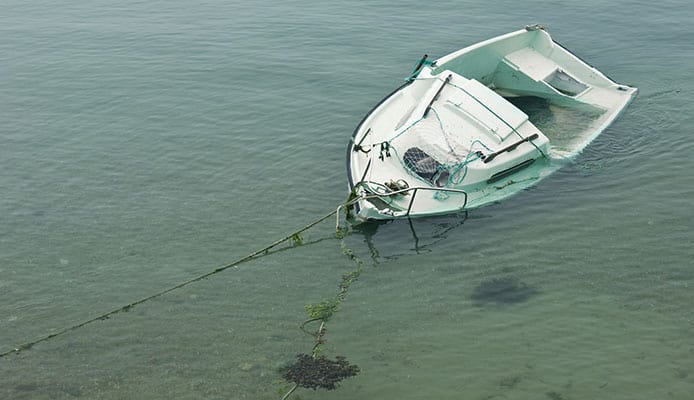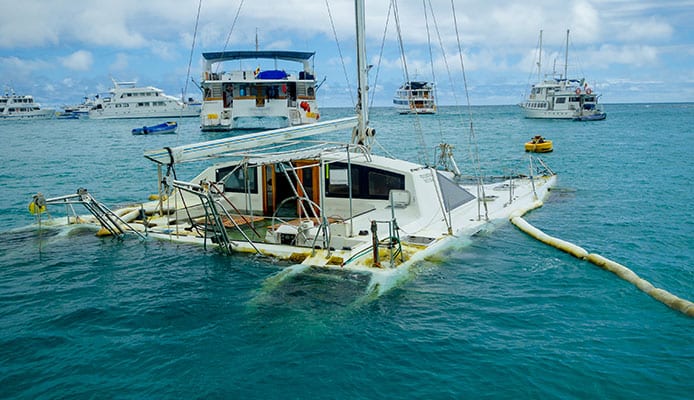
One of the biggest fears that many people have when it comes to boating is being in a capsizing vessel. And although this can happen to most types of water vessels, small and open boats are more prone to capsize due to their size and design. Fortunately, most boats are likely to remain floating even when they’re overturned – a scenario that is much better than having it sink slowly to the bottom of the sea. In general, though, such mishaps shouldn’t happen if the necessary precautions were taken. Nonetheless, it is still important for any boater to know what to do if the boat capsizes. So what should you do if your small open boat capsizes?
Before we answer that question, let’s first take a look at the different reasons why a boat capsizes. Knowing these will help you to avoid mistakes that may lead to such accidents.
What Causes a Boat to Capsize?
There are various reasons why boats capsize. On top of the list are overloading, leaks, and bad water and weather conditions.
Overloading
Overloading simply means putting too much weight on the boat, although improper weight distribution which causes an imbalance in the boat can also be assigned to this category. In any case, small and open boats are more susceptible to the effects of overloading than larger boats. That is, larger vessels may be able to handle a reasonable amount of extra weight and still stay afloat; whereas a smaller boat simply can’t.
Boat manufacturers are generally required to indicate the weight capacity of their vessels regardless of their type or size. If this information is not displayed on the boat itself, it can still be found in the product manual provided to the buyer upon purchasing the boat. If not, such information may be found on the boat manufacturer’s website.
That said, boaters must pay strict attention to these numbers. Exceeding the capacity limits, even when boating in calm waters, is asking for trouble.
Leaks
Leaks are another common cause of capsizing among boats. When water enters the vessel, water will start to pool at the bottom of the boat, and while in motion the water will slosh around the bottom which then affects the boat’s stability. When this happens, unforgiving waves and wakes can cause the boat to flip and capsize. Bilge pumps can be used to pump the water out, but it’s still best to prevent entry right from the start.
Several things cause leaks in water vessels like a damaged hull, loose fittings, or a missing drain plug. This is why it is important to always inspect your boat for any of these issues before you head out to the water. Also, taking the necessary precautions like putting the drain plugin should be made into a habit. If you keep forgetting to do so, then you may want to tie the drain plug to your boat key so you’ll be reminded of it whenever you’re about to turn on the engine.
Bad Water and Weather Conditions
Bad water and weather condition is another common reason for capsizes. Larger water vessels may be able to handle relatively rough waters and strong winds, though even large boats can be flipped over by a sudden and strong squall. However, smaller vessels can be overwhelmed by modest waves or wakes. This is especially true when they’re fully loaded or overloaded since they’ll be sitting low in the water because of the weight.
Experienced boaters know very well how quickly the weather conditions can change in the open water. That said, boaters should be aware of the weather forecasts before sailing, and if they see any signs of bad weather they should turn the boat and head back to the docks immediately. They should also know what to do if they get caught in bad water and weather conditions (e.g. gathering the passengers and having them stay low near the center of the boat to maintain stability).
You might also like: Boat Voltmeter Wiring Guide: Hook Up Voltimetear Easy And Fast
What to Do When the Boat Capsizes
Despite all your preparations and taking the necessary precautions, there may still be instances when you find yourself in a capsizing boat. When this happens, keep the following tips and advice in mind.
Keep Calm and Conserve Your Energy
A natural reaction for most people when their boat capsizes is to panic and try to swim furiously to stay afloat. However, this is probably one of the worst things you can do. Instead, stay calm and conserve your energy by floating or treading the water. If possible, try to climb up the upturned boat and out of the water. This will not only make you feel safer, but it will also help fend off hypothermia (staying in the water will only make you feel colder). Keeping a positive attitude by knowing that you’ve prepared for this scenario and that help is on the way will also help you stay calm.
Stay Close to the Boat
Staying close to an overturned boat offers a better chance of you being found as opposed to a person floating alone in the water. If someone is looking for you from a helicopter or a boat from afar, the size and color of the hull will be much easier to spot. Also, if the boat is small enough, you may even be able to right the vessel and get yourself out of the water.
If you have enough strength, gather any floating debris and tether them to the boat. This will make your boat an even bigger target and make it easier for rescuers to find.
Check Your Fellow Passengers
If you’re boating with your family or friends, you’ll want to do a headcount once you’ve gotten control of your panic and have a good hold on the boat. Make sure that everybody is accounted for and that they’re all wearing a life jacket or holding onto a flotation device (or any debris that helps keep them afloat and their head above the water. If possible, call out to everyone and have them move closer to the boat.
Signal for Help
Once you and everybody else are secured, it’s time to get some help. Signal flares or smoke flares can be of great help in instances like these. If you were lucky enough to salvage your phone or your VHF marine radio, you should try to use them too. You can also tie a brightly colored piece of cloth to your paddle or fishing rod and make a flag which you can prop up against the boat’s hull or any floating object.
Be Prepared for the Worst
There’s a saying that goes “Whatever can go wrong, will go wrong”. True, unfortunate events can still sneak up when you least expect them, so it’s still best to be prepared.
- Before you leave, file a float plan and have someone onshore who knows when to expect you back or hear from you. They should be ready to alert emergency rescue services if you didn’t come back on schedule or can’t be contacted.
- Make sure that you’re carrying proper signaling devices onboard your boat.
- Make sure that the weight is evenly distributed throughout the boat by providing seating arrangements or stacking coolers and other items properly.
- Check the weather forecasts before you head for the water, and keep your monitor turned on so you can be alerted for any sudden changes in the weather and water conditions. You can also do the same if your marine GPS has a barometer function.
Globo Surf Overview
Although most boats are generally safe, there are still instances of boat capsizes and they’re more common than most people realize. If you’re operating a small boat, it’s a good idea to always be prepared for this type of emergency and know what to do if the boat capsizes. If possible, take a course on boating as this can teach you a lot about boating safety, what should you do if your small open boat capsizes, and other important information that can help you in times of accidents and emergencies.


